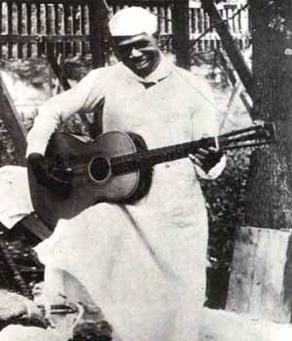Barbecue Bob facts for kids
Quick facts for kids
Barbecue Bob
|
|
|---|---|

Robert Hicks, "Barbecue Bob" (1927)
|
|
| Background information | |
| Birth name | Robert Hicks |
| Also known as | Barbecue Bob |
| Born | September 11, 1902 Walnut Grove, Georgia, U.S. |
| Died | October 21, 1931 (aged 29) Lithonia, Georgia, U.S. |
| Genres | Piedmont blues, country blues |
| Instruments | Guitar, vocals |
| Years active | 1920s–1931 |
| Associated acts | Curley Weaver |
Robert Hicks, known as Barbecue Bob (born September 11, 1902 – died October 21, 1931), was an important early American Piedmont blues musician. He got his nickname because he worked as a cook in a barbecue restaurant. One famous photo of him shows him playing his guitar while wearing a white apron and a cook's hat.
Contents
Early Life and Music Beginnings
Robert Hicks was born in Walnut Grove, Georgia. His parents, Charlie and Mary Hicks, were farmers. Robert and his brother, Charlie Hicks, learned to play the guitar from Savannah "Dip" Weaver, who was the mother of their friend Curley Weaver.
Barbecue Bob first played a 6-string guitar. But after moving to Atlanta, Georgia in 1924, he started playing the 12-string guitar. He became one of the most well-known musicians in the new Atlanta blues music scene.
In Atlanta, Robert worked different jobs and played music in his free time. While working at Tidwells' Barbecue, he was noticed by Dan Hornsby, a talent scout for Columbia Records. Hornsby recorded Barbecue Bob's music. To help promote his records, Hornsby used Robert's job. He had Robert pose in a chef's uniform for pictures and gave him the stage name "Barbecue Bob." Before he passed away in 1931, Robert married a woman named Claudine.
Music Career and Hits
During his short music career, Barbecue Bob recorded 68 songs on 78-rpm records. His very first song, "Barbecue Blues," was recorded in March 1927. This record quickly sold 15,000 copies! It made him a very popular artist for Columbia Records' series of records for African-American listeners.
After this first success, his next song made him even more famous. In June 1927, he recorded "Mississippi Heavy Water Blues" in New York City. This song was inspired by the terrible Great Mississippi Flood of 1927. This song and his other blues songs were very popular. His records sold better than those of many other Atlanta blues musicians.
On November 5, 1927, in Atlanta, he recorded "It Won't Be Long Now" with his brother Charley Lincoln. This song was a duet with talking parts. In April 1928, Barbecue Bob recorded two songs with singer Nellie Florence, who he had known since childhood. He also made "Mississippi Low Levee Blues," which was a follow-up to "Mississippi Heavy Water Blues." In April 1930, he recorded "We Sure Got Hard Times Now." This song talked about the difficult times of the Great Depression.
Barbecue Bob mostly played blues music. However, he also recorded some traditional songs and spirituals. These included "When the Saints Go Marching In" and "Poor Boy, Long Ways from Home."
In December 1930, Barbecue Bob also recorded as part of a group called the Georgia Cotton Pickers. The group included Bob, the guitarist Curley Weaver, and harmonica player Buddy Moss. They recorded a few songs together. These included their version of Blind Blake's "Diddie Wa Diddie" and the Mississippi Sheiks' "Sitting on Top of the World." These were the last songs Barbecue Bob ever recorded.
Robert Hicks passed away in Lithonia, Georgia, on October 21, 1931. He was 29 years old. He became very sick with a combination of illnesses. It is said that his song "Mississippi Heavy Water Blues" was played at his graveside before he was buried.
Musical Style
Barbecue Bob had a special way of playing the guitar. It was called a "flailing" or "frailing" style. This style is often used with the banjo (like clawhammer banjo playing). His brother and Curley Weaver also used this style at first.
He often used a bottleneck on his 12-string guitar. He played in a basic style that used an open Spanish tuning. This was similar to the style of Charley Patton. Barbecue Bob had a strong voice. He would make growling sounds and sing in a high voice (called falsetto). His singing style was also very rhythmic.
Influence on Music
Barbecue Bob had some influence on other blues musicians in Atlanta, like a young Buddy Moss. However, his unique guitar playing style was soon overshadowed by the "finger-picked" Piedmont blues style. This new style became more popular in the late 1920s and early 1930s. You can hear this change in the later recordings of Curley Weaver.
Barbecue Bob's song "Motherless Child Blues" was recorded and performed by the famous musician Eric Clapton. Also, John Fahey said that his own version of "Poor Boy a Long Ways from Home" was inspired by Barbecue Bob's recording.
Barbecue Bob's older brother, Charley Lincoln, also played blues music. He recorded for Columbia Records under the name Laughing Charley Lincoln. However, he did not become as famous as his brother.
See also
 In Spanish: Barbecue Bob para niños
In Spanish: Barbecue Bob para niños
- List of blues musicians
- List of country blues musicians
- List of guitarists
- List of nicknames of blues musicians
- List of Piedmont blues musicians
- Yazoo Records
 | Delilah Pierce |
 | Gordon Parks |
 | Augusta Savage |
 | Charles Ethan Porter |

